What is a comprehensive information protection system (CIPS) and what are its advantages?
The De Novo has a valid certificate of compliance of the CIPS for the cloud and data center, which allows providing services with the highest level of protection of user information.
All critical hardware infrastructure is physically located in a shielded module. Management of the infrastructure is carried out through a special VPN tunnel, which is encrypted using protocols in accordance with state standards. Network reliability is ensured by protected external communication channels with the possibility of connecting the Secure Internet Access Node (ZVID) and special communication networks of the SE "Ukrainian Special Systems".
A comprehensive information protection system is an interconnected set of organizational and engineering measures, means and methods of information protection. The main purpose of CSZI is to ensure the confidentiality, integrity and availability of information processed in the data center or cloud environment.
The implementation of CIPS requires careful preparation, the involvement of highly qualified specialists, and painstaking work on creating a system in accordance with state standards. The main components of KSZI include:
- Organizational measures. Unify policies and procedures related to information protection — access management, passwords, algorithms for responding to cyber security incidents.
- Engineering and technical measures. These are hardware and software means of information protection - firewalls, intrusion detection systems (IDS), intrusion prevention systems (IPS), antivirus programs and encryption systems, etc..
- Information protection methods. Combines cryptographic measures, access control tools, data backup and recovery methods.
DE NOVO CERTIFICATES
De Novo's operational processes comply with high SAP standards.De Novo`s cyber security meets ISO27001 standards. Our infrastructure, data center, and cloud management systems have received government certificates and comply with all data security requirements. All of the above is confirmed by our own data center's impeccable work, which had zero downtime since 2010.
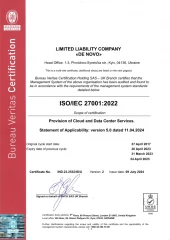
ISO / IEC 27001 Certificate of compliance Ukraine and Europe Clouds
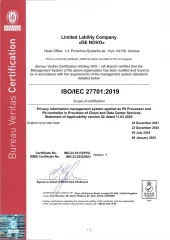
ISO / IEC 27701 Certificate of compliance
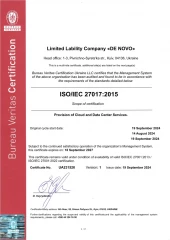
ISO / IEC 27017 Certificate of compliance
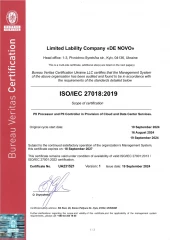
ISO / IEC 27018 Certificate of compliance
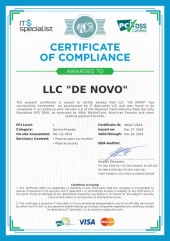
Data center compliance with PCI DSS requirements
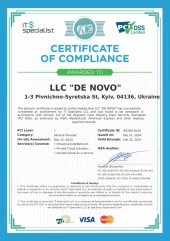
Cloud compliance with PCI DSS requirements
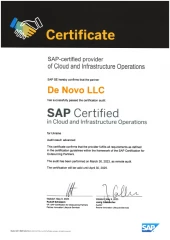
SAP Certified in Cloud and Infrastructure Operations

HPI Infrastructure Government Certificate of compliance

KSZI Certificate for Cloud Service Management Systems

IaaS / PaaS cloud services KSZI certificate
Get a consultation
Why is a CIPS needed at an enterprise?
In today's digital transformation environment, data resource protection is becoming a critical aspect of any enterprise's operations. Data is not only operational information, but also a strategic asset, the leakage or modification of which can lead to financial losses, loss of competitive advantages, or even legal consequences. That is why a comprehensive enterprise information protection system (abbreviated as CIPS) is a necessary component of the IT infrastructure.
CIPS is not a standalone software product or hardware solution. It comprises a suite of organisational, engineering, software, hardware, and cryptographic tools that function as a cohesive unit. The aim of implementing a comprehensive information protection system is to ensure the confidentiality, integrity, and availability of data in line with established requirements and potential threats.
In practice, comprehensive information protection systems encompass the following components:
- user identification and authentication tools;
- access control to data resources;
- security event logging and auditing systems;
- cryptographic protection of data transmission and storage;
- antivirus and malware protection;
- data backup and recovery;
- network perimeter protection and traffic analysis segmentation.
In addition to technical means, a comprehensive information protection system entails the implementation of organisational measures—information security policies, incident response procedures, regular staff training, and monitoring compliance with the rules. It is crucial to understand that the CIPS must be tailored to the specifics of the enterprise: its structure, the volume of processed data, the level of risk, and legislative requirements. For instance, legislation may impose mandatory requirements for the creation and certification of such systems for entities processing personal data or state information systems.
Therefore, comprehensive information protection systems are not merely excessive bureaucracy, but rather a necessary tool for ensuring stable business operations in the face of ever-growing cyber threats. They not only minimise technical risks, but also enhance the overall culture of information security within the enterprise.
How to obtain a certificate of conformity with the CIPS?
Obtaining a certificate of compliance with the CIPS is a necessary step for enterprises that process data with restricted access, including personal data, information containing state secrets, or other sensitive data. This process confirms that the implemented CIPS meets the established regulatory requirements in the area of technical information protection.
The process of obtaining a certificate of conformity to the CIPS comprises several key stages:
- Development of project documentation: first, it is essential to prepare a technical specification, a threat model, a technical passport for the informatization object, and other accompanying documentation. All documents must comply with regulatory acts in the field of data protection.
- System implementation: at this stage, the technical and software security tools provided by the project are being implemented - encryption tools, access control, antivirus protection, auditing, etc.
- Preliminary testing: an internal review of the system's performance and its adherence to the threat model is conducted.
- Conformity assessment: an accredited body is involved, which conducts a series of tests, audits the documentation, and analyses the implemented technical solutions. A report is compiled based on the results.
- Issuance of the document: in the event of successful completion of all checks, a CIPS certificate is issued, that is, a certificate of conformity to the CIPS, which certifies the system's readiness for operation under data protection conditions.
It is important to note that the obtained certificate of conformity to the CIPS has a limited validity period, after which re-assessment is required. Additionally, any significant changes in the IT infrastructure necessitate updating the certification procedures.
What are the stages involved in creating a CIPS?
Creating a comprehensive information protection system (CIPS) is a systematic process aimed at ensuring an appropriate level of security for the processing, storage, and transmission of restricted data. This process necessitates technical accuracy, adherence to regulatory requirements, and strict compliance with regulated stages.
The procedure for creating a CIPS begins with project initiation, which includes an analysis of information flows within the enterprise and the determination of categories of protected data. At this stage, a working group is also formed, responsible persons are identified, a work schedule is developed, and the technical means that will be used in the future system are established.
The next step is to establish a CIPS, which begins with the creation of a technical specification and a threat model. The threat model should consider potential scenarios of unauthorised access, data leakage, integrity violations, or denial of service.
Following this, the CIPS is constructed, which involves the implementation of the necessary technical and software protection tools in accordance with the approved model. These may include authentication tools, cryptographic protection, firewalls, attack detection systems, access control to data resources, and event auditing, among others. A crucial aspect of the construction process is the formalisation of security policies, user instructions, and personnel training. The final stage involves internal testing of the system, verification of the implemented protection mechanisms, preparation of certification documentation, and subsequent compliance assessment procedures.
Thus, the creation of a CIPS is not a one-off action but a complex process that encompasses design, technical implementation, documentation, and verification of the system's effectiveness. Adhering to a clearly defined procedure for creating a CIPS ensures compliance with current legislation and effectively safeguards the company's critical data.
What is a SIAN and why is it needed?
A secure Internet access node (SIAN) is a specialised technical complex that provides a secure connection of internal information systems of an enterprise or institution to the global Internet. Its main function is to guarantee the confidentiality, integrity, and availability of data when interacting with external resources, minimising the risks of unauthorised access, data leakage, or cyber threats.
Secure Internet access nodes implement a range of information security measures, which include hardware and software for firewalling, traffic analysis, spam filtering, data encryption, multi-level user authentication, and action logging. Such nodes may also incorporate intrusion detection and prevention mechanisms (IDS/IPS), antivirus control, access control to network resources, and critical data backup systems.
A typical architecture of a secure Internet access node includes network segmentation (DMZ zones), VPN gateways for remote users, proxy servers for web access control, and monitoring and response systems for security incidents.
The use of SIAN is mandatory or recommended for organisations that handle critical information or data subject to legal protection. It enables control over all access points to the Internet, centralises security policies, and enhances the overall data security of the enterprise infrastructure. Implementing a secure Internet access node is a key component of a comprehensive approach to cyber protection in modern IT environments.
Who needs to pass the CIPS certification?
Certification of a comprehensive information protection system (CIPS) is a formal process for verifying the compliance of an implemented system with regulatory requirements for data protection in information and telecommunications systems. Its purpose is to confirm the system's capability to provide an appropriate level of data security for processing data with restricted access, particularly personal, confidential, or official data.
According to the Law of Ukraine on Information Protection in Information and Telecommunications Systems, all entities that create or operate data and communication systems processing information with restricted access are required to undergo CIPS certification.
Such entities include:
- state authorities and local governments;
- enterprises, institutions, and organisations, regardless of their form of ownership, if they have access to official, confidential, or personal data;
- operators of critical infrastructure and facilities whose activities are related to ensuring national security;
- organisations that provide processing or storage of data in the interests of third parties, including within the framework of cloud or outsourcing services.
Certification is also necessary for enterprises handling state secrets, or if it is explicitly stipulated by their industry regulatory documentation.
In the context of data protection in automated systems, the certification of the CIPS is not merely a formality, but also a practical tool for enhancing the security of information assets. It encompasses analysing threats, developing a protection model, implementing technical and organisational security measures, conducting tests, and documenting the results.
The key regulatory document governing the requirements for such activities is the Law of Ukraine on Information Protection in Information and Communication Systems, which establishes general principles for organising data protection, access criteria, security levels, and control procedures.
Therefore, the necessity for certification is defined not only by the nature of the information being processed but also by the role of the entity within the country's data infrastructure. Adhering to the legislative requirements concerning data protection in information and telecommunications systems is not merely a legal obligation; it is also a crucial component of the sustainable operation of the IT environment.
How can one obtain approval or an opinion from the SSSCIPU?
Obtaining approval or an expert opinion from the State Service of Special Communications and Information Protection of Ukraine (SSSCIPU) is a crucial stage for organisations implementing data protection systems, particularly in cases involving the processing of information with restricted access, such as official, confidential, or state secret data.
The procedure for obtaining an opinion or approval from the SSSCIPU is governed by several regulatory documents, including the procedure for the development, implementation, certification, and maintenance of complex information protection systems.
The process consists of several compulsory stages:
- Preparation of technical documentation, including technical specifications, threat models, system architecture, specifications for protection tools, organisational policies, and so forth.
- Submission of an application to the SSSCIPU: the initiating organisation submits an official request to the service for the review of documentation to obtain an opinion or approval.
- The service's specialists assess the submitted materials, ensuring they comply with regulatory legal acts concerning the protection of technical and cryptographic data.
- Approval or return for revision. Based on the results of the expert examination, the SSSCIPU may provide: an expert opinion on the compliance of the proposed solutions with security requirements; approval for the use of certain data protection tools; and a requirement to make changes and rectify the identified shortcomings.
The formal approval or conclusion is a mandatory document used later for the certification of the system or the implementation of the informatization object into operation. It is important to note that the procedure is formal in nature and requires strict adherence to regulations, ensuring uniform approaches to information protection at the state level.
Therefore, collaborating with the State Service for Special Communications and Information Protection of Ukraine is a crucial component in ensuring the legitimacy and effectiveness of the protective systems implemented in critical IT infrastructures.
What is CTIP?
CTIP (Complex of Technical Information Protection) is a comprehensive set of organisational and technical measures, engineering solutions, and specialised means designed to prevent unauthorised access to information, its leakage, modification, or destruction within automated or information and telecommunication systems.
The primary objective of technical information protection (TIP) is to ensure the integrity, confidentiality, and availability of data processed, stored, or transmitted within the IT infrastructure. TIP is particularly pertinent in cases involving information with restricted access: official, personal, confidential, or that which constitutes a state secret.
The framework for protecting technical data comprises the following key components:
- Engineering and technical methods of protection include the physical restriction of access to premises and the blocking of technical channels that allow information leakage, such as electromagnetic radiation.
- Software and hardware solutions: cryptographic protection measures, firewalls, access control systems, video surveillance, and automated intrusion detection systems.
- Organisational measures: user working regulations, data security policies, guidelines for using protected equipment, personnel training.
- Control and audit: monitoring systems, event logging, and regular assessments of the effectiveness of the applied TIP means.
The deployment of the CTIP starts with analysing current threats and defining a security model. Following this, a set of appropriate technical and organisational measures is designed and implemented. The final stage involves the certification or assessment of the system's compliance with the requirements of regulatory legal acts in the field of data protection.
The proper implementation of a complex of technical information protection not only minimises the risks of leakage or loss of critical data but also ensures that the system complies with current legislation and standards. This is particularly vital for government agencies, critical infrastructure facilities, and companies handling sensitive information.
Thus, CTIP is not a separate device or solution, but a systematic approach to establishing a secure information environment, considering all potential vectors of impact. The complex nature of technical information protection ensures a holistic defence at both the technology and user levels.
What is the difference between CIPS and TIPS?
In the field of information security, confusion often arises between the concepts of CIPS (comprehensive information protection system) and TIPS (technical information protection system). Although both terms refer to measures to ensure information security, there are significant differences between them in terms of composition, purpose and level of integration.
CIPS is a fully functional system that encompasses both technical and organisational measures to ensure data protection. It is developed in accordance with legislative requirements and includes a comprehensive range of resources: engineering solutions, software and hardware, security policies, personnel training, incident response procedures, and more. The primary objective of a comprehensive information protection system is to ensure that the information system adheres to the requirements for processing data with restricted access. The outcome of implementing CSI is successful certification and the acquisition of the relevant certificate.
Technical Information Protection Systems (TIPS) are highly specialised solutions that implement specific protection functions. For example, a traffic encryption system, network-level access control, intrusion detection, or disk data encryption. A Technical Information Protection System may be part of a TIPS, but on its own, it does not cover the full range of security measures required for certification.
In other words, TIPS is one of the tools used in building a CSII. Its task is to implement individual elements of technical information protection in accordance with the identified threats and security model. For example, in the context of a data protection system on the Internet, STSI may be responsible for filtering web traffic, protecting against DDoS attacks, or checking SSL certificates.
Another difference lies in the degree of regulation. For CIPS, there is a formalised certification procedure, requirements for the threat model, documentation, and implementation. In contrast, TIPS has less stringent requirements and can be applied even in cases where protecting restricted information is not a concern.
Therefore, the CIPS is a systematic approach to information security that encompasses the entire range of technical and organisational measures, whereas technical information protection systems are distinct technical components that carry out specific functions within the overall protection architecture. All TIPS are integral elements of the CIPS, but not every TIPS can provide full protection without being integrated into a comprehensive system.








